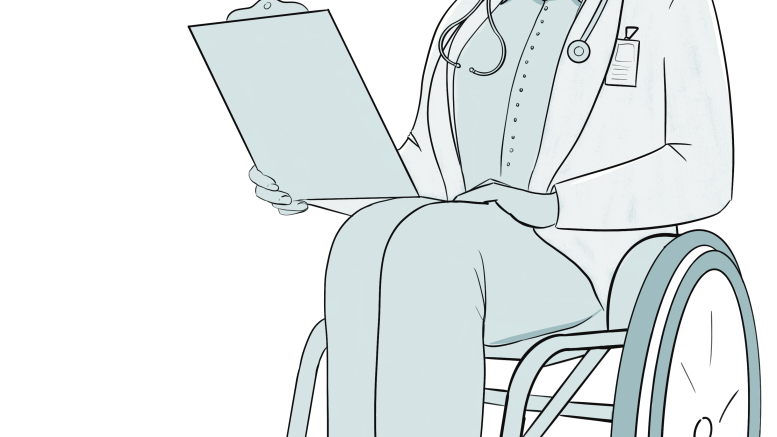Grace Spence Green endured a T4 spinal cord injury in 2018 when she was paralyzed by a falling man while studying medicine in London. Now a physician, she shared her story and spoke about the need for inclusivity and anti-ableism in the U of M’s “Listen Up Series: Empowering Medicine; Unleashing the Potential of Disabled Physicians in Shaping Healthcare Perspectives” event.
“It was a real shock to the system,” Spence Green said. “Suddenly I was waking up at 6 a.m. every day for wheelchair skills classes, learning all the new equipment and medication that I needed […] It struck me, after my injury, that I really didn’t know what it meant to be disabled.”
Spence Green explained that she felt pushed to follow a three-part “classic narrative” surrounding disabled people. The first part was that, as a young wheelchair user, she must be involved with sports, becoming a Paralympic athlete. The second was that she must take on an immense physical feat, such as climbing a mountain.
The third and main component, Spence Green said, was that she must learn to walk again.
Working to regain her mobility, she would spend five hours each day driving to a physiotherapy service for several months. Those around her congratulated her on her effort.
“It just struck me after a while, who am I doing this for? Because I was becoming quite comfortable as a wheelchair user,” said Spence Green. “I could wheel around now quite happily. I felt quite comfortable in myself. But this felt strange. This felt aberrant.”
Considering society’s views on disability, she realized that people with disabilities are often portrayed in British media as falling into a few limited tropes. People with disabilities are stereotyped as needing charity, being ridiculed or being exceptionally inspirational.
Yet, for Spence Green, none of these tropes seemed to fit.
“I started to have to reckon with a lot of internalized ableism that I had,” she said. “That was difficult to confront, but I think absolutely necessary.”
Spence Green made several recommendations on working towards a more inclusive, accessible community.
She highlighted the importance of recognizing one’s own biases and lack of knowledge. She loves hearing colleagues communicate when they don’t know how to accommodate her and invite her to teach them or share her knowledge.
“That’s exactly what I want to hear,” Spence Green said. “When they’re eager to learn and they’re not assuming.”
Spence Green added that colleagues often assume she is unable to maneuver doors, only to find that while she is comfortable with doors, she may find other aspects of the physical environment challenging to navigate. She finds it helpful “when [she is] allowed to lead the conversations about access.”
She also emphasized the importance of language. Much of the language surrounding people with disabilities is passive. People often use terms like “wheelchair-bound” or “in a wheelchair” to describe her, rather than more active language.
“Language affects attitudes and attitudes affect behaviour,” she said. “The way we describe patients and colleagues is how we treat them.”
She brought up the prevalence of inappropriate terms used in the medical environment, questioning how anyone will realize there are better words to use if the medical systems themselves continue to use terms like wheelchair-bound.
“I find, as a patient as well, if a doctor uses the word wheelchair-bound, immediately there’s a wall put up between us,” she said. “I think you don’t see this as a tool for me […] it’s a comorbidity or is something that you are confined to, and it’s completely negating the fact that this is my independence, actually. This is my autonomy, this is how I move, this is how I work, this is how I do everything.”
The medical system in Britain, said Spence Green, tends to pathologize disability. The attitude that disability is something that must be fixed affects the treatment of people with disabilities. Mobility devices like the ones she uses are seen as a “failure.”
“I’m really starting to think about the fact that a lot of people don’t want to be cured,” she stated. “I don’t. Lots of people don’t need to be fixed, they need adaptations, and that will be what empowers them.”
Spence Green emphasized the need for neutrality when thinking about disability. She reiterated her desire to be considered neither a tragedy nor an inspiration, but simply a person.
She highlighted the importance of representation, noting that 30 years prior to her, a student with a spinal cord injury attended her university.
“I think that’s why representation is so important,” she said, “because [university staff] did know that, and they thought ‘well, if someone has done it in the past, we will be able to do it again.’ And so maybe if they hadn’t had that, maybe it would’ve been harder to imagine it.”
“Ultimately we just need to imagine more accessible futures.”





